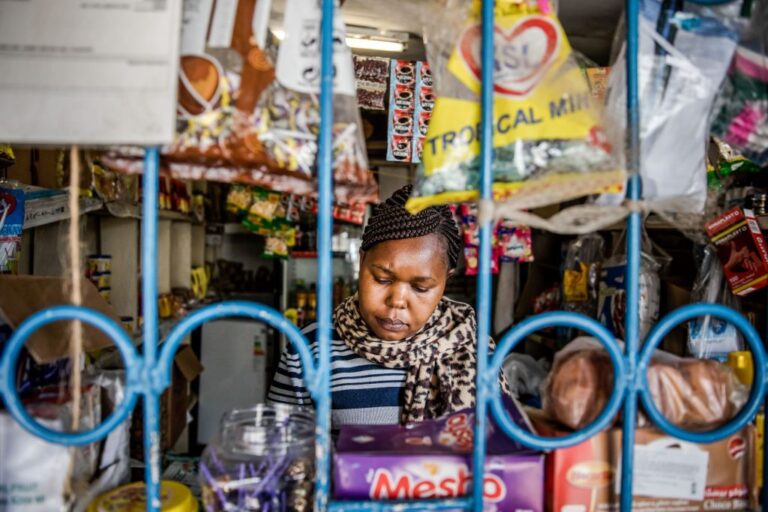You can also listen to this podcast on iono.fm here.
ADVERTISEMENT
CONTINUE READING BELOW
Download the free LiSTN audio app on Google Play, Apple or here.
JIMMY MOYAHA: The recent increase in the spaza shops complainants and developments around the selling of expired goods has sparked the interest of government, and they intend to resolve the problem by potentially having audits put in place, as well as having traditional leaders and municipalities keep records of foreign nationals in their communities.
I’m joined on the line by Sharon Ekambaram, the head of the Refugee and Migrant Rights Programme at Lawyers for Human Rights, to take a look at this. Good day. Sharon, thanks so much for the time. What are your thoughts on the government’s plans? Is this the way to go or is this simply shifting the blame?
SHARON EKAMBARAM: I just want to take a step back and I see that the Minister in the Presidency (Khumbudzo Ntshavheni) reported on a workshop where they spoke about the effects of illegal immigration, and involved in this was [the departments of] Traditional Affairs, Human Settlements and Home Affairs, small business development.
Listen/read: Call for unscrupulous spaza shops to be investigated
But it’s striking that there’s been no formations of organisations on the ground, like the South African Waste Pickers Association (Sawpa), the South African Informal Traders Association (Saita), which are all working on the ground to assist and organise themselves in the informal sector. I think it’s very concerning for me that this kind of decision gets taken without proper engagement with the community once again.
I think in that context, it’s an ill-informed decision, it smacks of scapegoating and blaming, and it’s based on absolutely no verified information and research.
The fact that we talk about illegal immigration without understanding the context and the failure of the very Department of Home Affairs to provide access to people who are struggling to get documentation in this country, is the first point that demonstrates just a wrongness of this decision that the government is taking.
JIMMY MOYAHA: Sharon, let’s look at the possible implications of this audit that’s being proposed. What would that potentially do to those responsible for the audits and those that are being audited?
SHARON EKAMBARAM: Firstly, if it’s only targeting spaza shops that are owned by foreign nationals, then it’s unlawful, it’s unconstitutional, and it will be challenged based on discrimination. We have challenged at a local government and provincial government level. Many of the proposed policies like the Gauteng policy that was looking at informal work, which wanted to exclude foreign nationals from this, the Township Economic Development Bill, and through our challenges those exclusions were removed.
But I think in general, when we talk about the risks that we know are very prevalent with selling of food, the importance of ensuring the quality of that food is proper standard, then this should be a procedure for all outlets that are selling food, including food manufacturers. We know what happened with Listeriosis and Tiger Brands.
Listen/read: How to identify fake food products
ADVERTISEMENT
CONTINUE READING BELOW
I just want to give you a fact to show that if you’re coming up with this kind of announcement, that you are going to be auditing all informal, and I’m hoping that it’s all food outlets, in Gauteng alone there is a massive shortage of environmental health inspectors.
So in Johannesburg, there is one official responsible for checking food sold to every 26 000 people, and in Gauteng we have a population of over 15 million people.
So you can’t make this statement, it’s very unclear, it smacks of divisions and xenophobia if you’re under the impression that it’s only people who are foreign nationals who are selling food that’s expired or who are selling food that’s not of the proper health standards. Then the second point is why do we not in this day and age, have adequate numbers of environmental health inspectors who should have been doing this anyway as a routine across the country.
JIMMY MOYAHA: Sharon, should traditional leaders be allowed to keep lists of foreign nationals, would this not fuel more xenophobic attacks in future?
SHARON EKAMBARAM: Well, of course it will, but it’s also a big question on the competence of traditional leaders to be verifying documentation, to be identifying foreign nationals or whether they’re migrants, refugees, asylum seekers, and would have relevant documentation depending on their status.
It’s totally unlawful to have traditional leaders doing the work of police and immigration officers.
But finally, I think we need to acknowledge that with traditional leaders, there is vulnerability to corruption, their autocracy is in question and the continued marginalisation of women. These are serious concerns that must be considered if you’re giving this kind of authority to this body and unleashing it on communities.
JIMMY MOYAHA: Sharon Ekambaram of Lawyers for Human Rights, thank you so much.

